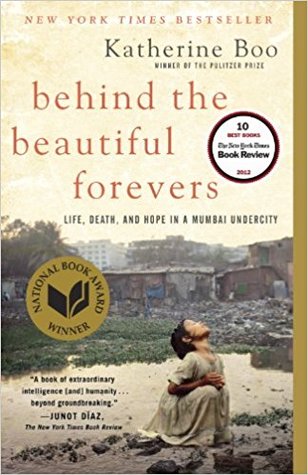More on this book
Community
Kindle Notes & Highlights
Read between
May 9 - May 13, 2019
The third side of Annawadi was a cratered road at the slum’s entrance where many scavengers lived. This side had no huts. Scavengers slept on top of their garbage bags to prevent other scavengers from stealing them. Petty thieves slept on the rut-road, too. Their main targets were construction sites around the airport, where builders were sometimes careless with screws, rods, and nails.
Vicky liked this
And there was enough oil in his hair to fry garlic.
Before each election, he’d used city money or tapped the largesse of a prominent American Christian charity, World Vision, to give Annawadi an amenity: a public toilet; a flagpole; gutters; a concrete platform by the sewage lake, where he usually stood when he came.
These water-brokers were resented, but not as much as the renegade World Vision social worker who had collected money from Annawadians for a new tap, then run away with it.
Manju hadn’t read The Way of the World, nor did her professors expect her to. Except in the best colleges, dominated by high-caste, affluent students, Indian liberal arts education was taught by rote. At her mediocre all-girls college, founded by the Lions Club, she was simply required to memorize a summary the teacher provided for each literary work on the syllabus, then restate it on the test and, later, on state board exams. Manju had a gift for memorization—she called it “my by-hearting.” But she found the characters in The Way of the World hard to keep straight.
It didn’t much matter whether a person learned the language by studying Congreve or by practicing Chase Manhattan Visa Card dialogue at Personaliteez Spoken English or one of the training courses for international call-center work. Competence in English—a credential bespeaking worldliness and superior education—was a potential springboard out of the slums. Her own English was still slow and wooden, though good enough to be the second-best
Her fifth son, Safdar, was the child she worried about. He was dreamy and impractical, like her husband. He loved frogs, and in pursuit of them sometimes swam the sewage lake. No one liked to sleep next to him after he did that.
The British had written the criminal code, and their strict anti-suicide provisions were designed to end a historical practice of families encouraging widows onto the funeral pyres of their dead husbands—a practice that relieved the families of the expense of feeding the widows.
burning, when people asked her, but he could have been twenty-seven, for all she knew. You didn’t keep track of a child’s years when you were fighting daily to keep him from starving, as she and many other Annawadi mothers had been doing when their teenagers were young.
In Delhi, politicians and intellectuals privately bemoaned the “irrationality” of the uneducated Indian masses, but when the government itself provided false answers to its citizens’ urgent concerns, rumor and conspiracy took wing. Sometimes, the conspiracies became a consolation for loss.
The richest man in India, Mukesh Ambani, had also lost money—billions—although not enough to impede construction on his famed twenty-seven-story house in south Mumbai. The lower stories would be reserved for cars and
the six hundred servants required by his family of five. Far more interesting to young slumdwellers was the fact that Ambani’s helicopters would land on the roof.
His next temp job was at Skygourmet, which made meals served on airplanes. Arriving at work, Mirchi stood under a blower that blasted the city dirt from his body, then loaded food onto pallets inside a cavernous freezer. It was miserable labor, carrying heavy containers when he was too cold to manage his limbs. Ice formed inside his runny nose, and when his flesh touched metal, it stuck. Still, he made two hundred rupees a day, until management cut back the temp staff.
Officers in the train station didn’t know how to use their weapons, and ran and hid as two terrorists killed more than fifty travelers. Other officers called to rescue inhabitants of a besieged maternity hospital stayed put at police headquarters, four blocks away. Ambulances failed to respond to the wounded. Military commandos took eight hours to reach the heart of the financial capital—a journey that involved an inconveniently parked jet, a stop to refuel, and a long bus ride from the Mumbai airport. By the time the commandos arrived in south Mumbai, the killings were all but over.


